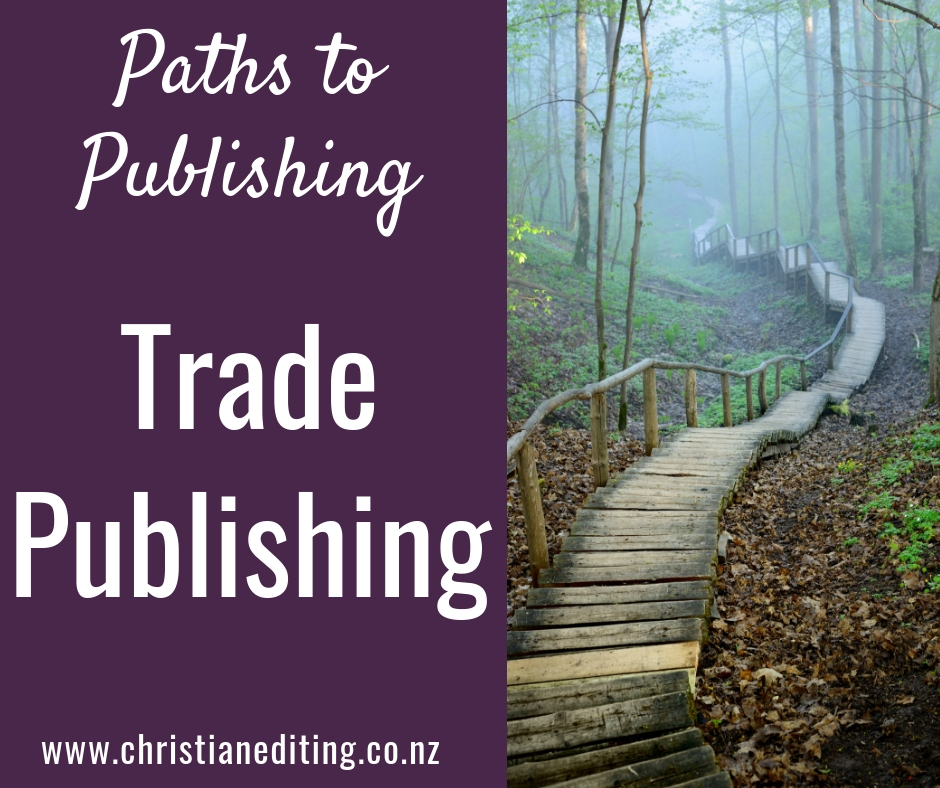When new writers ask how to get published, they’re usually asking how to get published by a traditional royalty-paying publisher, one who will get their books in bookshops. What they often don’t know is there are other ways to publish—and there are “publishers” who prey on newbie writers.
It’s important for all writers to know and understand the main paths to publishing, and the advantages and disadvantages of each.
Over the next four weeks I’m going cover the four main paths to publishing:
1. Trade Publishing
2. Small Press Publishing
3. Self-Publishing
4. Vanity Publishing
Note that while these are all options, only three of them are options worth considering, and the “best” option will depend on your personal aims in writing and publishing. There is no one right answer for everyone. But there is one wrong answer!
Trade Publishing
Trade publishing is the official term for what can also be called traditional publishing, trad publishing, or legacy publishing. It’s what most people mean when they say “publishing”.
If you visit your local bookstore or library, most of the books you see on the shelves will have come through these big trade publishers, with names like HarperCollins, Penguin, Random House, or Simon & Schuster.
Most publishing houses have a range of imprints, each of which will target a different market.
For example, Harlequin, Love Inspired, Mills & Boon, Thomas Nelson and Zondervan are all imprints of HarperCollins.
Few trade publishers accept direct submissions from new authors, preferring to deal directly with literary agents. (Click here to read my post on how to find a Christian literary agent.) Authors are paid through advances and royalties, with a portion (usually 15%) of each payment going to their agent.
Under the trade publishing model, an author writes a book, and a publisher purchases the rights to publish and sell the book in specified formats (e.g. hardcover, paperback, digital, audiobook) and in specified locations (e.g. the United States and Canada, Australasia) in a specified language (e.g. English).
In return for the specified rights, the publisher will pay the author a royalty on the sale of each book. The royalty is expressed either as a percentage of the recommended retail price, or as a percentage of the actual selling price. Trade publishers may also pay an advance.
A publishing advance is similar to asking the boss for an advance.
It is an up-front payment which will be credited against future earnings (in this case, royalty payments). An author who gets an advance won’t get any other payments from the publisher until the book has sold enough copies that the royalties on the sold copies equal the advance payment made. In publishing terms, this means the advance has “earned out”.
For many Christian fiction authors, this is the publishing dream.
A contract from one of the major publishers, whether a Big Five imprint, or one of the major independent publishers operating exclusively within the Christian fiction market. These are probably are the publishers who publish your favourite Christian writers, authors like Irene Hannon, Karen Kingsbury, DiAnn Mills, James L Rubart or Susan May Warren.
These are the paperbacks you see in your local Christian bookstore, online at Amazon or Christian Book Distributors or Koorong, and in large print hardcover at your local library.
The big publishers publish four or more fiction titles a month. They have beautiful covers. The books are well written and well edited. The authors have pretty websites. Their Amazon pages are full of glowing reviews (often because the publishers have included an expensive blog tour as part of the book’s marketing package).
It’s easy to see why any Christian fiction author would want to be published with one of these companies. It’s a sign you’re a ‘real’ author; you’ve made it.
But there is a down side.
While these publishers produce four or more fiction titles a month, that’s only a tiny fraction of the manuscripts submitted to them. Most of their books will be from established authors. They may have as few as six slots in their annual publishing schedule for novels from a debut authors.
That means a lot of competition for those coveted publishing contracts, and a lot of pressure to deliver in order to win the next contract.


Iola, You’ve hit on a real problem, toward the end of your post. It’s not a cinch that you’ll get a contract from one of the large houses, or if it will be renewed once you’ve fulfilled it (even if it “earned out”). If you get one of those coveted slots, don’t think you’ve “got it made.” Sports are not the only activities where “what have you done for me lately” is applicable. Thanks for this series.